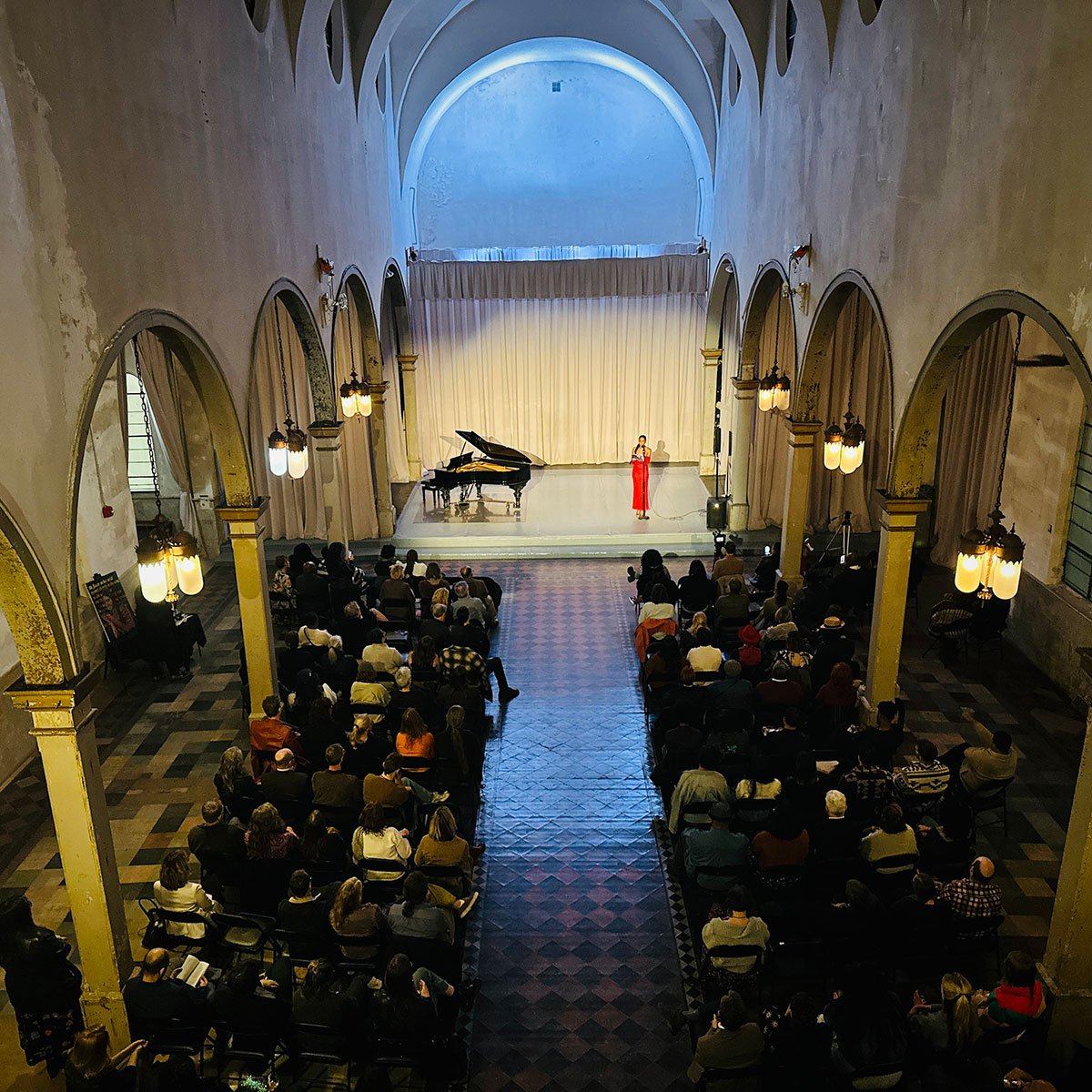Skye Jackson’s “Libre”: An Interview
Skye Jackson at the New Orleans Jazz Museum
May 2025New Orleans poet Skye Jackson gives candid insights about her life, her writing process and her powerhouse debut book of poetry, “Libre.”
– by Ellis Anderson, photos by Ellis AndersonIntroductionThis column is underwritten in part by Karen Hinton & Howard Glaser
I first met Skye Jackson in UNO’s creative writing grad program, called the Creative Writing Workshop. My own concentration was on Creative Nonfiction, which offered a big advantage – a mixing of the genres. Everyone in the program had to take at least one nonfiction workshop, so classes also included screenwriters, fiction writers and poets – many of whom had never tackled writing nonfiction before. Skye, who worked in the legal field in her previous life, wrote prose that was as enticing as her poems. Her pieces always riveted the class. They combined the elements that make her poetry so stellar: sharp observations, exquisite language, a pacing and tension that never disappoints. She deftly exposes the humor present even in difficult situations. And her sentences possess the rhythms of waves, of heartbeats, of songs – the sort that you find yourself humming for days after you’ve heard them.When French Quarter Journal began taking shape in 2019, we knew we wanted a poetry component and with crossed fingers, asked Skye if she’d become FQJ’s poetry editor. She said yes. The journal launched just before the pandemic shutdowns, but Skye and a few others helped keep its head above water over the next few years with terrific columns (including her incisive interviews with Jericho Brown and John Warner Smith) and encouraging energy. Since FQJ’s relaunch two years ago, she’s remained a pivotal part of the FQJ team, while serving as Visiting Writer & Lecturer at Xavier University and having work appear in journals like RHINO, Palette Poetry and the Southern Review. Literary prizes like the AWP Intro Journals Award and inclusion in the Billy Collins Poetry 180 Project at the Library of Congress demonstrate that nationally, people are taking note of her work. And now, her debut poetry collection, Libre, was recently published by Regalo Press and is being distributed by Simon & Schuster. So we’re especially pleased to celebrate along with Skye and to offer this conversation about Libre, along with a few excerpts from the book.FQJ: Your poems in Libre evoked so many feelings as I read. But you have the priceless knack of presenting a situation and not adding commentary or trying to elicit a particular emotional response from a reader. How do you manage that?
“can we touch your hair,” the book’s first poem – and the one selected by Billy Collins for the 180 Project, is a perfect example. Here’s an excerpt:
…they circle me
& ask:
can we touch your hair?
then suddenly
just like my ancestors long ago,
i am pulled apart
soft
by pale hands
from all directions.
SJ: It's interesting when you bring that up. People get so invested in the landscape and situations of the poems. They’ll say, “I hate these figures or characters” in the poems. I try to give people grace in different situations yet still bringing these scenarios and situations to light so we can have conversations about them. And writing helps me to understand how I feel about a situation. But if I felt the emotion too strongly, I wouldn’t be able to write the poem.
I’ve taken some flak with that approach. Other poets ask me, “why don’t I see your anger? Or where’s the rage?” It’s not my duty to communicate that, it’s my duty to communicate the experience and let the reader decide what they want to feel about it. I don’t want to tell anyone how to feel about my work.
As writers, we relinquish control the moment we put something out into the world. So it’s not my role to try to have control and say this is how you should read the poem or this is what I was trying to say. The relationship between what’s on the page and what’s happening in your spirit and your mind as you read the poem is a very private, intimate thing and I have nothing to do with that. If we do our job well enough as writers, we don’t have to tell people how to feel. They’ll just know.
FQJ: What themes did you keep in mind when assembling this collection?
SJ: One of the main themes explores how the past and present exist simultaneously, especially in a city like New Orleans, where echoes of the past meet our present time in ways that are very haunting. That was something I really tried to convey in the book.
A lot of the poems focus on my experiences as a young Black woman in the world and trying to navigate that. Slavery has a long legacy and footprint, especially because New Orleans was a major port city for slavery. And there are the themes of family, of change, of capitalism and what it forces us to do.
I had a job working in the French Quarter while I was in grad school – a part time gig. It was startling to see people buying racist products. I was forced to be complicit within this system, and I didn’t want to be a part of that.
FQJ: You captured that so well in this verse of “spoon rest mammies”:
ii
at the end of my shift
a latina woman
with frizzy bleached blonde
hair stands in front of me
i’m from California
she says
just buying these for my kids
as a joke
they’re gonna be so mad
I bought these
she hands me two
of the mammy spoon rests
& says
make sure you wrap them up good
i’d hate
for them to break
on the flight back home
so i protect them
in paper and bubble wrap
carefully place each one
in a plastic bag
you know, the lady says
your store shouldn’t carry these
i hand her the bag
smile and say
but they sell…
FQJ: What were the biggest challenges in putting together this collection?
SJ: There’s a saying that a poem is never finished, it’s just abandoned [laughter]. It’s so hard for poets to know when something is done. I found myself going back and changing things over and over again. It was a challenge that I had to contend with in the final stages of editing.
Another unexpected challenge was navigating the inclusion of song lyrics in the collection and the process of getting those cleared [for publication] was daunting. Two poems that were supposed to make it into the book didn’t because we couldn’t get the clearance in time. I hadn’t thought about those concerns when I was initially writing the poems.
These are things no one tells you in a workshop: that you need to look at writing from a business and legal perspective instead of just a literary endeavor. But I’m looking at these challenges as lessons, and I hope to keep these concerns in mind as my career progresses.
Skye Jackson at the Febuary 13, 2025 book launch and reading at the Marigny Opera House.
FQJ: I also laughed aloud several times while reading. There’s the poem “my dad doesn’t know how to fight the wasps in the mailbox,” in which you refer to yourself as a “kitchen oracle” and joke with your father, “don’t you know we’re in a housing crisis and good real estate is hard to come by?”
Another favorite is “grocery list for when my ex comes to visit.” Here’s an excerpt:
…bubble bath
lavender epsom salt
pillar candles
whiskey for balcony hot toddies
condoms
black teddy
sheer lace stay-ups
various meats (he’ll want steak)
coffee
bread
another mug
to finally place
next to mine
on the shelf
black beans
brown eggs
tissues
matches to start
a fire
neither of us
will know
what to do with…
SJ: Sometimes I get sad because I don’t think poetry is fun enough. I want to always bring my voice into the poem and I love to laugh and be irreverent and ridiculous sometimes, finding the humor in these messy human situations that happen in all of our lives. The task becomes how to communicate humor in a poem – you don’t have a lot of room to do it…and you want things to land effectively and the way that you intended them to.
FQJ: That’s really a love poem – like many of them in the collection. And the sometimes affectionate portraits of your family, do you consider them love poems too?
SK: Yes, they’re love poems too. Poets are nostalgic, We have a hard time letting things go, that’s indicated throughout my work. So something I’m always trying to do in my work is to preserve memories and people. These love poems to family and lovers to keep their memories alive. My poetry is an experiment in archival exploration.
It’s my version of The Notebook [laughter]. When I’m 95, I’ll be reading it and saying wow! That girl had such an interesting life.
FQJ: Do you feel your voice maturing, becoming more confident?
SJ: My voice, in my mind, feels like it’s constantly changing. My newer work – poems I haven’t started sharing yet, seems different. But I want to be constantly evolving as an artist. And even though I want my voice to sound distinctive, I don’t want to be a one trick pony. There’s the temptation to do that and write poems that you know other people want to hear from you. So I often ask myself…Should I be writing for a specific audience? Or just for myself? I think there’s a balance to be achieved there.
FQJ: Has teaching this year given you a new perspective on writing?
SJ: I’m very new to teaching – I just completed my first year doing it full-time. But I’ve always loved school and dreamt of being a professor when I was in college. It’s interesting seeing these things in my life come full circle – both amazing and terrifying. What do you do when your dreams come true? What does happily ever after look like? Is there such a thing?
FQJ: What’s next?
SJ: Right now, I’m in Orlando in a writing residency at the Jack Kerouac house. He lived here with his mother while he wrote the Dharma Bums just before he became super famous. He was living the struggling writer’s life, not knowing how dramatically his life was going to change.
I’m giving myself permission to rest, to reflect on my life and think about what comes next. Lately, I’ve just been racing from place to place for readings and from class to class. We all get to that point sometimes in life. It can be hard to remind yourself to slow down and pay attention to what’s happening around you.
I’m decompressing and nurturing my creative self – which means looking at art, watching movies, reading. I’m filling my artistic well so I can continue to write and make art.





